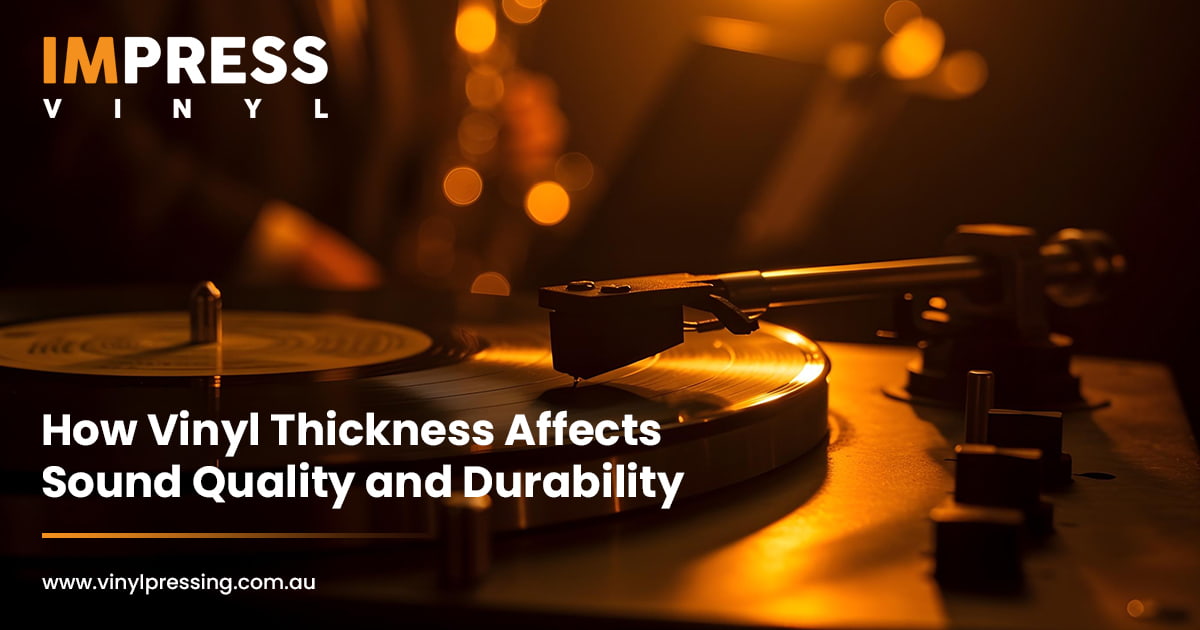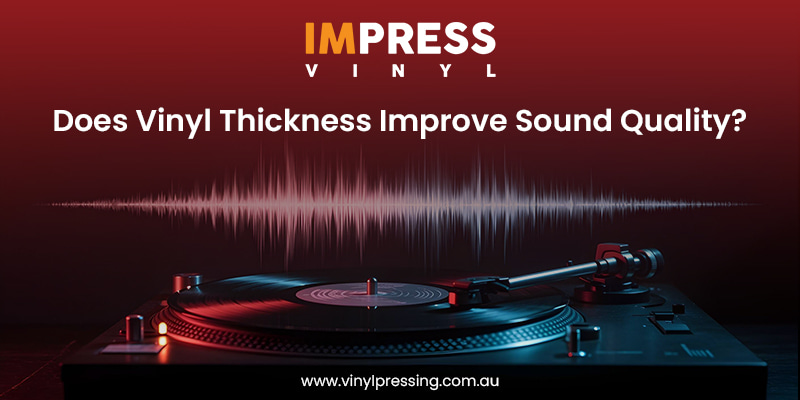How Vinyl Thickness Affects Sound Quality and Durability

Have you ever picked up a record and thought, “Wow, this one feels heavier”? Maybe you have been told that thicker vinyl sounds better or that 180-gram records are built for audiophiles.
These claims are mostly common, and if you are someone who collects, spins, or simply appreciates vinyl, then it is only natural to wonder if there is truth behind them.
Vinyl has made a huge comeback, not just as a nostalgic medium but also as a preferred listening experience for music lovers. And with this revival comes a wave of questions, especially about the physical characteristics of records.
One of the most debated topics in vinyl communities is the impact of record thickness (or more accurately, vinyl weight) on sound quality and long-term durability.
Understanding Vinyl Thickness and Weight
When we talk about vinyl thickness, we refer to the weight of the record. We all know that standard vinyl records are pressed in different weights, with the most common being around 120g to 140g. Heavier variants, such as 180g or even 200g, are often labeled as “audiophile” pressings.
While the increase in physical thickness from a 120g to a 180g record may only be a few tenths of a millimeter, the weight change is very noticeable when holding them. This added weight gives the record a sturdier feel and changes the way it interacts with a turntable.
But here is the key: the grooves on the record and the actual carriers of sound are not affected by the weight itself. The music, whether pressed onto a lightweight or heavyweight record, is etched into the vinyl’s surface in the same way. That means a well-pressed 120g record can sound just as good as a 180g one, and it depends entirely on how the record was mastered and manufactured.
Does Vinyl Thickness Improve Sound Quality?

This is indeed the most debated point among vinyl listeners. Many believe that heavier vinyl automatically equals better sound, but the reality is more nuanced.
From a purely technical standpoint, the sound quality of a record depends primarily on the mastering process, the condition of the stamper, the precision of the pressing, and the quality of the vinyl compound used.
Thickness or weight does not directly improve audio fidelity. If the grooves are identical, the sonic experience should, in theory, be the same regardless of whether the record weighs 120g or 180g.
However, there are indirect advantages to thicker vinyl when it comes to playback. Heavier records tend to sit more firmly on the turntable platter, reducing the chance of slippage or vibration. This creates a more stable rotation, allowing the stylus to track more precisely, especially on sensitive or high-end turntables.
Some listeners report hearing slightly less surface noise or more consistent playback on 180g vinyl, not because the grooves are better but because the physical stability is improved.
In short, while thicker vinyl does not guarantee better sound, it may contribute to a more stable and enjoyable listening experience, especially on well-calibrated equipment.
Durability- Where Thicker Vinyl Truly Shines
When it comes to long-term durability at that time, vinyl record thickness plays a much clearer and more significant role.
Thicker records are more resistant to warping, bending, and cracking. Vinyl, being a form of plastic, is susceptible to heat, pressure, and improper storage. These lightweight records, particularly those 120g or lower, are more prone to develop warps over time if exposed to poor conditions or stacked unevenly.
Heavier records, like 180g variants, are physically more robust. They are less likely to flex when handled and better withstand the natural pressures of storage and repeated use. If you’ve ever attempted to clean a record and noticed how flimsy it feels, then you appreciate that durability is a major concern for collectors wanting their investments to last.
For DJs who routinely deal with transporting records or those living in hotter regions, added thickness can help prevent wear and tear. Even non-collectors can take comfort in knowing their vinyl will remain in good condition for many years down the line.
Is 180g Vinyl Always Better? The Marketing Perspective
It is important to address the common belief that 180g vinyl record thickness is inherently “audiophile quality.” Many record labels and reissue companies use the 180g label as a marketing point, which leads consumers to assume that heavier means higher fidelity.
While it is true that many high-quality pressings happen to be on 180g vinyl, it is not because of the weight alone. These pressings often come from better sources like original analog masters or high-resolution digital files and are manufactured at top-tier pressing plants.
So the better sound you hear from these records is due to the entire production process, not just the added grams.
Unfortunately, not all 180g records are made with the same care. Some are simply repressed from existing digital files with no improvement in mastering or audio dynamics. This means it is very possible to get a mediocre-sounding 180g record and an excellent-sounding 140g one.
To make a wise choice, it is better to look into the mastering source, the label’s reputation, and reviews from trusted communities rather than going by weight alone.
Playback Compatibility and Turntable Setup Considerations
Another overlooked factor is how the effect of vinyl thickness on sound quality interacts with your turntable setup. On many high-end turntables, the tonearm height and stylus angle (known as VTA or Vertical Tracking Angle) are adjustable. When switching between records of different thicknesses, VTA can change slightly. While most casual listeners won’t notice this, audiophiles might detect tonal differences, especially on very detailed sound systems.
On automatic turntables, heavier vinyl might affect cueing, auto-return, or stylus pressure if not adjusted correctly. Thicker records also require slightly more care when stacking or changing records frequently, as they can increase vertical pressure if not spaced correctly.
The Longevity of Your Collection: Why Thickness May Be Worth the Extra Cost
For serious collectors, vinyl sound quality is more than just a format; it is a long-term investment and an archive of personal or cultural significance. Thicker records simply last longer. They age better, are easier to handle, and maintain their shape over decades. If you’re planning to keep your records in good shape for 10, 20, or even 50 years, the added cost of heavier vinyl is often worth it.
In addition, because 180g pressings are often associated with limited editions or collector’s releases, they tend to retain or increase their value over time. From a resale or archival standpoint, thicker records hold up better in both physical condition and market appeal.
Conclusion
Vinyl thickness plays a subtle yet meaningful role in the listening and collecting experience. While it doesn’t directly improve sound quality, it does contribute to stability during playback and significantly enhances long-term durability. The sensation of holding a heavy, solid record also adds to the overall tactile experience of vinyl, a big part of why many people love this format in the first place.
At the end of the day, it is about balance. If you are investing in rare records, playing them regularly, or looking to build a long-lasting collection, then choosing 180g vinyl makes sense. Just remember, weight alone does not define quality. It is the mastering, pressing, and storage that truly shape the sound and increase the lifespan of your vinyl.
Ready to press your next record in high-quality, heavyweight vinyl? Get in touch with Impress Vinyl pressing experts today and let us create something that looks, feels, and sounds incredible.